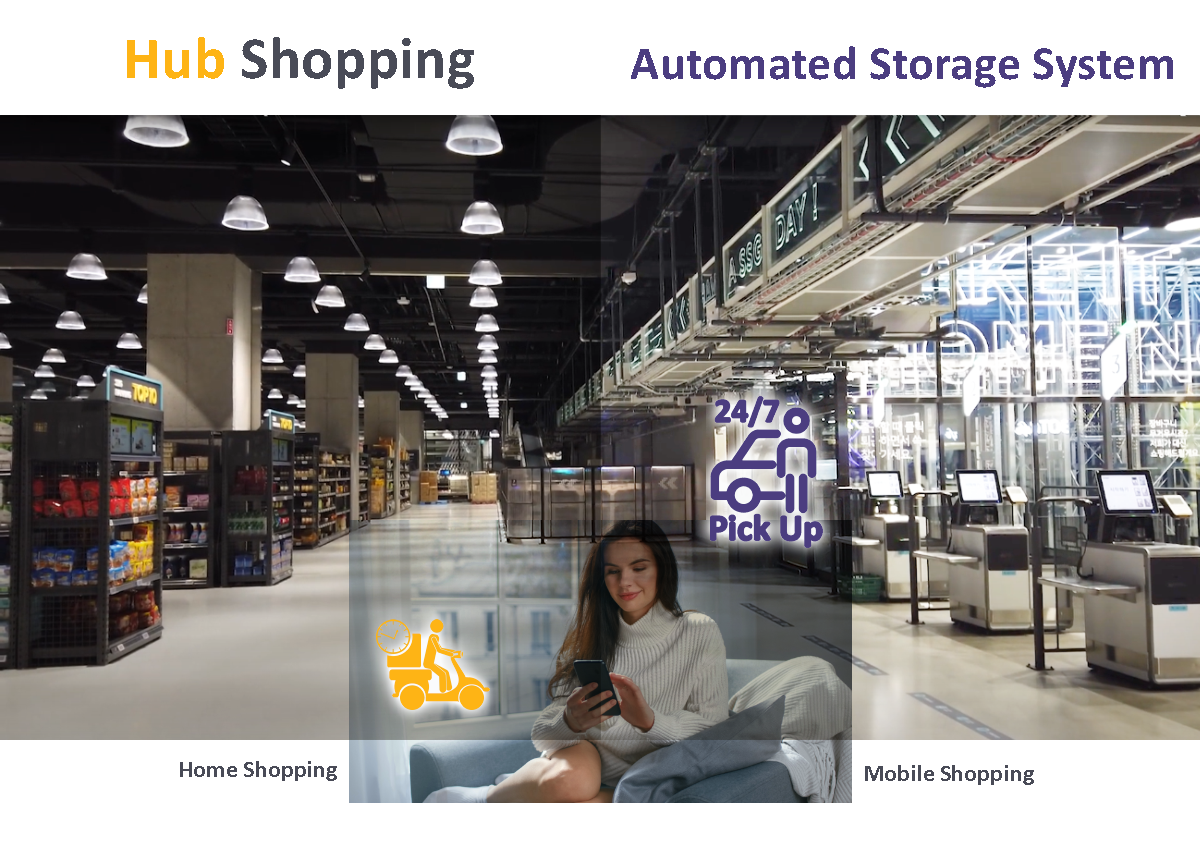
Autonomous Retail Systems (ARS) – Allowing the possible to do the impossible creates a new reality – Image: @xpert.digital
The Autonomous Retail System (ARS) - The birth of autonomous retail
➡️Autonomous Retail Systems (ARS) – Allowing the possible to do the impossible creates a new reality – expanding sales channels
The philosophical concept of autonomy was largely coined by the German philosopher Immanuel Kant: Autonomy depends on overcoming existing forms of dependence and heteronomy, even if these appear to offer a certain degree of security. Autonomy refers to the state of self-determination, independence, self-management or freedom of decision or action.
Today, when many people think of autonomy or automation in retail and logistics, they immediately think of job destruction, robotics, zero service, no people at the checkout, cold and desolation.
Issues like urbanization scare some people. You live in it and yet you can't talk about it. Even if there are opportunities for the better, one longs for the apparent security. Everything should stay as it is right now. Out of insecurity or comfort. What is certain is that nothing is certain. Not even that.
For “lazy” editors, it is a safe business if you don't want to sell it with your clientele. This partly explains the skeptical views of the general public. The two camps, for example, at Tesla: his fans and haters. The pro for environmental protection, but the petrol heating must remain. The coal must not die and much more. Hardly anyone sees the chances in the new because it is not reported to how the “lazy” editors devotedly serve their topics recurring. Or much easier: because you have no idea about it and therefore cannot report about it. But that's just a part of the truth. We live in a time of big changes and that brings a lot of ignorance and a lot of uncertainty. What's next? What else happens? How much does that affect you?
Above all: What impact does all this have on existing processes that have been trusted and secure for decades? And because that is the case, you are flooded with all sorts of confusing and diverse information. But that doesn't make it any better.
So let's start from the beginning, with autonomy, with the ARS.
Conditions for an ARS
When shopping, you are currently tied to time and place. Likewise also the how. How one can shop is determined by the prevailing strategies and systems. Be it in the city or in the country.
How can you shop better? More efficient for suppliers and buyers? The following conditions are attached to it:
Home shopping
- Pick up goods
- Continue shopping locally
- Bring service/delivery service
Mobile shopping
- Pick up goods
- Continue shopping locally
Hub Shopping
- Online shopping in the meeting area (e.g. in a Cafe Hubspot)
- Real shopping experience
Payment systems
- Cashless
- Contactless payment
- Paying at the non-autonomous checkout (presence of cashiers)
particularities
- 24/7 Service – Shop and receive goods around the clock
- 24/7 Meeting Area – Café, snacks etc. around the clock
Automated warehouse
We all know the problem. No condensed milk for your coffee? Accidentally forgotten to buy drinks on time? It's Sunday? Many a trip to the gas station saved the situation. But unfortunately that is also insufficient. Not all products can be found at the gas station and opening times are also limited.
But where there is a gas station, wouldn't an autonomous retail system also be profitable? The catchment area and infrastructure would be there.
In any case, it must be an automated warehouse. Because here, the maximum possible items are stored intelligently and optimally in the smallest space. Monitoring the expiry dates of the products and the correct storage of dry to cold-sensitive products are essential features.
Allowing the possible to do the impossible creates a new reality
In order to be able to accomplish all of these factors, many people's imagination stops beforehand: the prevailing opinions are that it can't be done, it's too complicated or it doesn't work.
Smart e-commerce strategy from South Korea
E-Mart
E-Mart is the largest retail company in South Korea. Samsung, Hyundai, KIA and LG are well-known brands from South Korea. 51 million people live there and its area is 3.5 times smaller than Germany. With 515 inhabitants per km², it is one of the most densely populated countries in the world.
E-Mart is the oldest and largest discount chain in South Korea, with total sales of more than $15.8 billion in 2018. As of December 2016, there were 160 stores nationwide. The company was founded on November 12, 1993 by the Shinsegae group of companies as the first discount retailer in South Korea. With new store openings and the acquisition of Walmart Korea in 2006, E-Mart has been able to expand its leading position in the retail and discount business. E-Mart offers everything from groceries to clothing to toiletries and a very large selection of goods. E-Mart also has an online shop. In addition to South Korea, the company also has stores in the People's Republic of China, Vietnam and Mongolia.
Shinsegae
Shinsegae is a South Korean group of companies based in Seoul that operates high-end department stores in Korea under the name Shinsegae and low-end department stores in South Korea and China under the name E-Mart. The name Shinsegae means New World.
As of 2014, the company owned around 15 upscale Shinsegae department stores in Korea, as well as 140 E-Mart discount stores in Korea and six in China. Shinsegae Department Stores is the second largest department store chain in the country after the Lotte chain. Sales revenue in 2006 amounted to 4.7 billion euros; In 2010 it was 10.5 billion euros with a net profit of more than 725 million euros. Direct competitors in Korea are Lotte Shopping and the Hyundai Department Store Group. Shinsegae employed 16,383 people as of December 2004. In 2010, E-Mart had 12,893 employees.
On May 22, 2006, the company announced that it would take over the 16 Korean Wal-Mart stores with 3,300 employees for 882 million US dollars (approx. 690 million euros) and convert them into e-marts. E-mart is the largest retailer in South Korea with a market share of about 30 percent.
Since 2009, the Shinsegae Centumcity Department Store in Busan has been considered the largest in the world at 293,905 m².
As of 2015, there were around 15 Shinsegae department stores in Korea, including a branch at Incheon Airport and two smaller Shinsegae Style Markets within E-Marts (the latter are also managed by E-Mart). In 2011 there was a separation into E-Mart Co., Ltd. (Discounter) and Shinsegae Department Store Co., Ltd. (high-end department stores). Since then, both companies have been subsidiaries of the parent Shinsegae Group.
A comparison of numbers for food retailers in Germany can be found here:
E-Mart's e-commerce strategy
In March 2019, Shinsegae Group, operator of South Korea's largest discount chain E-Mart, launched the online shopping mall SSG.COM.
It is an integrated company of two online shopping stores - Shinsegae Department Stores Mall and E-Mart Discounter Mall.
By integrating online shopping processes, the rapidly growing demand for e-commerce offerings under the SSG.COM brand is to be efficiently expanded into the future market.
Shinsegae aims to generate revenue of 2.3 billion euros from its online shopping business in 2019, up 29 percent from 1.74 billion euros last year.
In the long term, the group aims to achieve sales of 7.25 billion euros by 2023, which will be supported by increasing demand for delivery services.
The group also operates Shinsegae, the country's second largest department store chain after the Lotte chain.
The online portal SSG.COM is completely controlled by E-Mart.
Before SSG.COM, several other online shops had already successfully launched into the e-commerce market. The first home shopping portal was CJ O Shopping. GS Home Shopping is also one of the digital pioneers for online sales; it first introduced TV shopping in South Korea in 1994. In 2001, the Hyundai Home Shopping Network Cooperation, Lotte Home Shopping and NS Shopping joined.
And then in 2010 SK Planet, a subsidiary of SK Telecom. SK Planet is an internet platform development company that focuses on e-commerce, online-to-offline services and digital marketing through its shopping portal 11st. Back in 2016, 11st became the most visited e-commerce website in South Korea. It is also the #1 mobile shopping app.
In 2019, Shinsegae Group started to catch up with E-Mart and SSG.COM. They rely on 4 components:
1. Online shopping platform SSG.COM
2. Offline pickup service for online orders (home or mobile shopping)
PIXEL, a derivative of Pick Cell, a pick-up service via the Smart Phone (Cell Phone). PIXEL is an online home and/or mobile ordering system that allows goods to be picked up locally.
The first O2O (Online to Offline) service in Korea.
3. Delivery service
4. Automated storage system in E-Mart's physical shopping mall for 24/7 availability of goods
(Department stores in South Korea are open Mon-Sun between 10:30 a.m. and 8:00 p.m. or 8:30 p.m.).
So all basic requirements for an ARS.
Around half of the 51.4 million South Koreans live in the capital Seoul or in neighboring satellite cities. The greater Seoul area is therefore the most important metropolitan area. That's why E-Mart currently operates what is probably the most modern shopping mall ever in Cheonggyecheon (a 10.9 kilometer long, modern public recreation area in the city center of the capital Seoul).
A special feature at E-Mart: The Meeting Point
Since almost everyone already has a smartphone, there is no need to provide separate internet terminals. Here at the Meeting Point you can order the goods in a relaxed atmosphere at a cafe via SSG.COM.
human factor
In a well-thought-out system, the human factor is not ignored. As great as the technical possibilities are, the sociological aspect of human coexistence is also taken into account. The face of autonomy is not the machine, but still the human being.
In addition to the information center (service station), cashiers and employees can also be found in the corridors. Even if only during the usual opening hours, it is still a humane overall concept. Jobs will not be eliminated and the shopping experience will not be leveled; it has been optimized for the future for both suppliers and customers.
Suitable for:
Xpert.plus-logistics advice and logistics optimization-industry expert, here with its own 'Xpert.digital Industrie-Hub' of over 1,500 specialist contributions
Xpert.Plus is a project from Xpert.Digital. We have many years of experience in supporting and advising on storage solutions and in warehouse optimization, which we bundle in a large network under Xpert.Plus.
I would be happy to serve as your personal advisor.
You can contact me by filling out the contact form below or simply call me on +49 89 89 674 804 (Munich) .
I'm looking forward to our joint project.
Xpert.Digital – Konrad Wolfenstein
Xpert.Digital is a hub for industry with a focus on digitalization, mechanical engineering, logistics/intralogistics and photovoltaics.
With our 360° business development solution, we support well-known companies from new business to after sales.
Market intelligence, smarketing, marketing automation, content development, PR, mail campaigns, personalized social media and lead nurturing are part of our digital tools.
You can find out more at: www.xpert.digital – www.xpert.solar – www.Xpert.Plus

